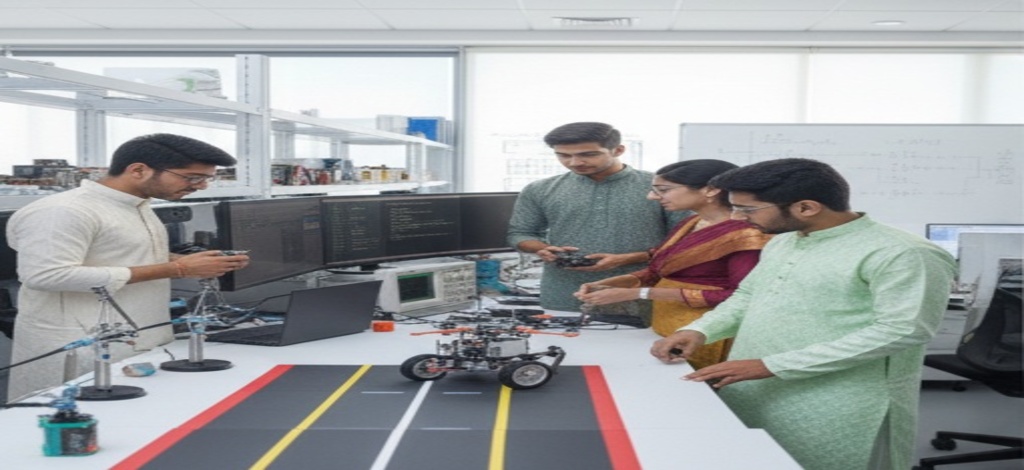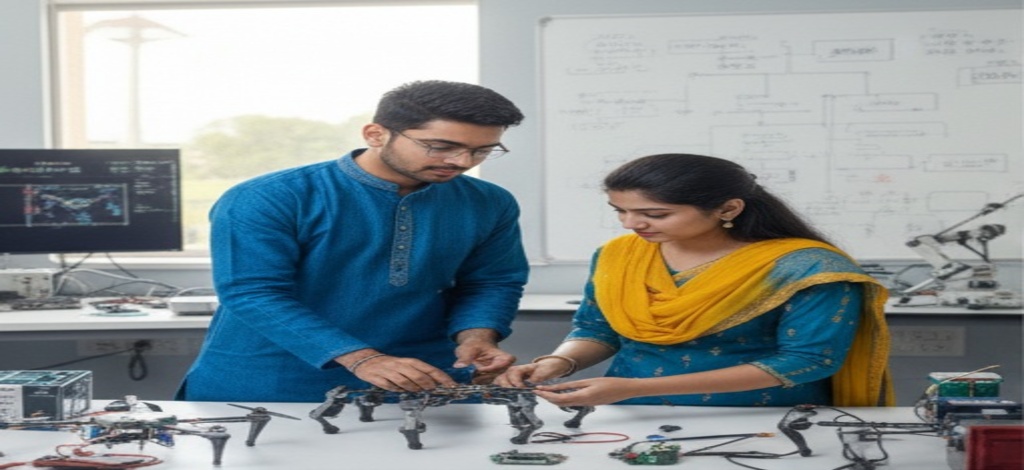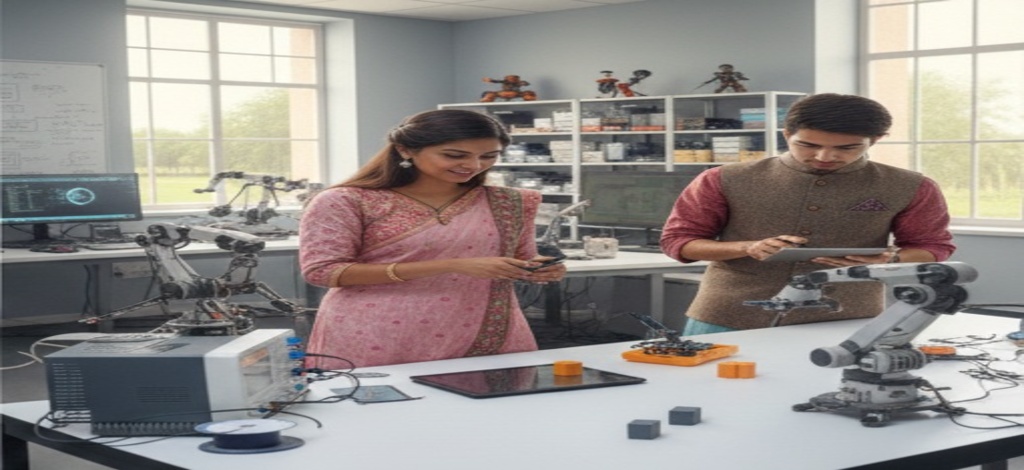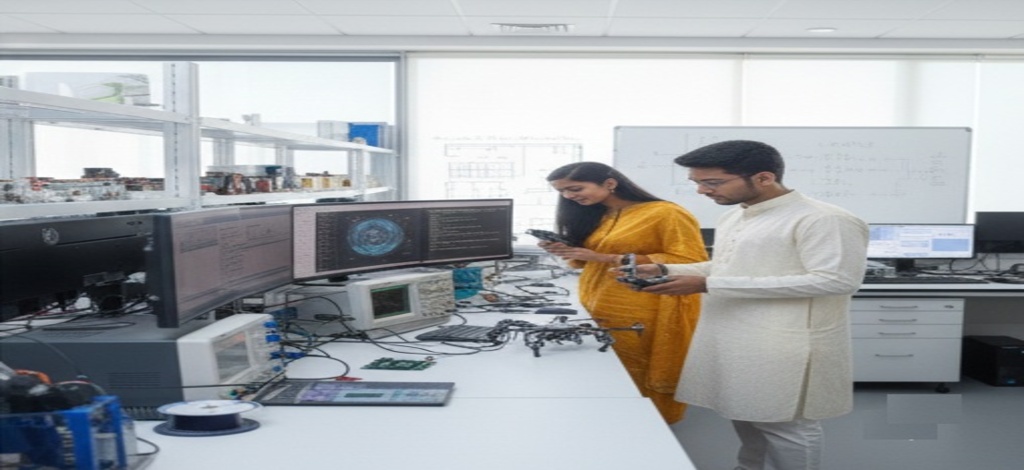Fundamentals of Robotronics Course
Dive into the fascinating world where robotics meets electronics! This Fundamentals of Robotronics Course introduces the core concepts of robot design, sensors, actuators, and control systems, empowering you to build and program intelligent machines. Perfect for beginners eager to transform ideas into real-world robotic solutions.
- 210 Hours (2 hours/day x 6 days/week x 18 weeks) OR at your own pace
- Hindi, English
- Learn & Get Certified
- Basic & Intermediate
- Hands-On Training




Online Course Fees
Offline Course Fees
About this course
Fundamentals of Robotronics Course provides an introduction to the interdisciplinary field that combines robotics, electronics, and automation. The course covers the basic principles of robot design, sensors, actuators, control systems, and microcontrollers, along with the integration of electronic components for robotic applications. Students will explore how mechanical systems, electronic circuits, and programming work together to create intelligent robotic systems. Through practical examples and hands-on activities, learners will gain foundational knowledge to understand and develop simple robotic solutions.
Learn the basics of robotics and electronics, including sensors, actuators, and microcontrollers, to build intelligent automated systems.
This course provides essential knowledge and practical training to build industry-relevant skills.
- Online Course Fees:
₹6000, ₹4000 (incl. GST) (Excluding tools & equipment cost) - Offline Course Fees:
₹12000, ₹9000 (incl. GST) (Excluding tools & equipment cost) - Certification: ESSCI
- Duration: 210 Hours (2 hours/day x 6 days/week x 18 weeks) OR at your own pace
What you'll learn
After this course you will learn:
- Understand the basics of robotics, automation, and mechatronics
- Explore sensors, actuators, and microcontrollers used in robots
- Learn fundamentals of robot motion, control systems, and navigation
- Gain hands-on experience in building and programming simple robots
- Discover real-world applications of robotics in industries and research
- Develop problem-solving skills for designing autonomous robotic solutions
Course Content
Why take this course?
This course introduces you to the integrated world of robotics, electronics, and intelligent control systems—collectively known as robotronics. You will learn how mechanical structures, sensors, actuators, embedded electronics, and basic programming work together to create functional robotic systems. By building a strong interdisciplinary foundation, this course helps you understand how real-world robots are designed, controlled, and automated. It is an ideal starting point for learners aspiring to careers in robotics, automation, mechatronics, and smart manufacturing, and prepares you for advanced studies in intelligent and autonomous systems.
How to use online TCoE platform?
Tools and Equipment required
National Skill Development Mission
Module 1: Knowing the parts and fundamentals of a robotics system operation
● Able to gain foundational understanding of robotics including basic principles and components of robotic systems
● Able to define key concepts of voltage, current, electricity and their relations
● Able to describe different types of circuits and circuit diagram
● Able to integrate and synthesize information gained in theory sessions for assembling and troubleshooting of connections practically
● Able to build and demonstrate basic projects on hardware and digital platform independently
● Able to demonstrate technical skills after completion of basic projects, justify with reasoning, and solve problems effectively
● Identify different types of robots
● Explain about diodes, darlington transistor, motors and their applications
● Reflect their learning on logic gates, compare and analyse using truth tables.
● Perform different hands-on projects on hardware and digital platforms about good conductors, amplification of current, use of fuse, Electricity conversion to other forms, effect of series and parallel circuits on loads, use of diodes, capacitors and logic gates.
● Develop critical thinking skills and the ability to draw well-reasoned conclusions.
● Improve their ability to formulate and communicate scientific findings of the projects performed.
Module 2: Understanding the fundamental functions and applications of a robotics system
● Understand the applications of robotics in different fields.
● Analyse the use of slide switch, latching circuits.
● Explore key concepts of DC motor and its types, Voltage, Current and RPM characteristics.
● List the steps to be performed for starting and analysing the functioning of the robot
● Understand RF communication and its applications
● Build and demonstrate Projects on Hardware and Digital Platform
● Apply knowledge to solve real-world problems.
● Demonstrate a comprehensive understanding of the fundamental principles, components, and types of robotic systems used in various applications.
● Understand Robot inputs, Batteries and motor driver units
● Perform practically different Movements of the robots
● Develop problem-solving skills related to diagnosing and resolving issues with robotic systems, as well as routine maintenance practices.
● Building Projects on Hardware of Conveyor Belt, Escalator belt, model of Hopping Robot & Cardboard Robot
Module 3: Testing and Maintenance of Robotics Systems
● Demonstrate proficiency in programming and controlling robotic systems
● Understand Arduino interactive prototyping platform
● Program robots using Arduino coding operations
● Build models of Walking robot, Carnival ride, Ant bot, Man Bot, FrogBot.
● Build different projects independently through arduino coding
● Implement control algorithms to make robots move and perform tasks accurately and efficiently.
● Understand how robots perceive their environment through sensors and how this data is used for decision-making.
● Understand the terms related to sensing, digitising, processing and analysis
● Differentiate types of sensors-assembly sensors, intelligent sensors, contact-non contact sensors.
● Demonstrate the working of a Reed Sensor, LDR Sensor with different Outputs
Module 4: Reporting and Documentation
● Classify and categorise sensors commonly used in robotics based on their sensing principles, applications, and characteristics.
● Ability to select the most appropriate sensors for specific robotic tasks
● Understand RF and Bluetooth communication
● Hands-on Build and demonstrate Robot with multiple applications using different sensors
● Classify and categorise robotic applications based on their domains and use cases
● Develop the skills to calibrate sensors and conduct tests to ensure their accuracy and reliability in robotic applications.
● Understand Life size Bot and their applications
● Apply and demonstrate robotic principles on different models -Line following robot, Auto metro train, Metal detector Robot, Pick and place robot, Voice Controlled Robot.
● Do assembly of life size bot, circuit connections and troubleshooting.
● Learn how to adapt and optimise robotic systems to address changing requirements and challenges within different applications.
● Develop teamwork and communication skills
ENROLL TODAY & GET 30% OFF ON ALL COURSES
Your Future Can’t Wait, Enroll Now and Save 30% On All Courses.
Related Courses

VLSI Design Engineer

Embedded IoT Specialist

Robotics Engineer: Level-2

SoC Architect
See what our students have to say
With over a decade of experience, our mission is to produce future-ready skilled resources.




Introduction to Sensors and Actuators
Explore the fundamentals of designing efficient robots and controlling their movements. This topic covers mechanical structures, kinematics, and control strategies, helping you understand how robots make decisions and execute tasks accurately. It provides the essential knowledge to build functional and intelligent robotic systems
Job Opportunities
Here are some interesting job opportunities after completing the Fundamentals of Robotronics course:
Robotics Engineer – Design and develop intelligent robotic systems for industries and research.
Automation Engineer – Implement automation solutions in manufacturing and production lines.
Embedded Systems Developer – Work on microcontroller-based robotic projects and smart devices.
Mechatronics Engineer – Integrate mechanical, electronic, and software components in robotic applications.
Robotics Technician – Maintain, repair, and troubleshoot robotic systems in labs or industries.
AI & Robotics Researcher – Contribute to innovation in intelligent machines and autonomous systems.
Robotics Instructor/Trainer – Teach robotics concepts and practical skills to students or professionals.
Frequently asked questions
Who should take this course?
This course is perfect for beginners, hobbyists, and anyone curious about robotics and electronics. No prior experience is required.
What will I learn in this course?
You’ll learn the basics of robotics, sensors, actuators, microcontrollers, and how to build and program simple robots.
Are there any hands-on projects?
Yes! The course emphasizes practical learning with interactive projects that let you design, build, and program real robots.
Do I need special equipment to join?
All the required components and simulation software are provided during the training.
How will this course help my career?
It lays a strong foundation for careers in robotics, automation, AI, and mechatronics, making you industry-ready for entry-level roles.
How long is the course?
The course is designed to be flexible, typically spanning a few weeks with hands-on exercises and assignments.

